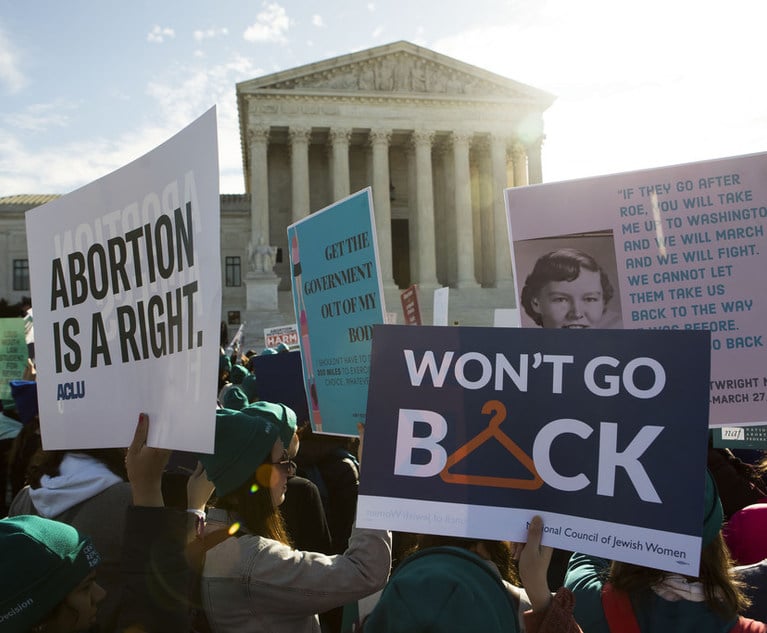Appeals Court Holds Daily Fantasy Sports Contests Illegal Gambling in NY
The justices in the majority in the split Appellate Division, Third Department decision assessed "whether IFS [interactive fantasy sports] contests involve a material degree of chance" and found that they did.
February 07, 2020 at 10:10 AM
5 minute read
The original version of this story was published on New York Law Journal
 (Photo: Andrew Harrer/Getty Images)
(Photo: Andrew Harrer/Getty Images)
A state appeals court struck down the bulk of a 2016 law that allowed interactive fantasy sports contests like FanDuel and DraftKings to operate in New York, writing that the daily contests could not be excluded from the state constitution's meaning of gambling "merely because the Legislature now says that it is so."
Thursday's split ruling, in which four of five Appellate Division, Third Department panel justices voted in the majority, appears to put daily fantasy sports contest companies in danger of being ousted from New York, although an appeal of Thursday's decision may be upcoming.
The Third Department panel considered a 2016-filed lawsuit in which several state taxpayers who claim to have been adversely affected by gambling challenged a new law that said daily fantasy sports contests—where players join short-term pools, assembling virtual teams of and wagering money on the in-game performances of athletes—did not constitute gambling, according to the majority justices' opinion.
The law, signed by Gov. Andrew Cuomo in August 2016, came from the state Legislature amending the Racing, Pari-Mutuel Wagering and Breeding Law by adding an article 14. Article 14, wrote the majority, provided for consumer safeguards, minimum standards and regulation of interactive daily fantasy sports providers while it effectively authorized their operation in New York.
 Justice Robert Mulvey (Courtesy photo)
Justice Robert Mulvey (Courtesy photo)In a lengthy opinion written by Justice Robert Mulvey, who was joined by Justices Elizabeth Garry, Christine Clark and Molly Reynolds Fitzgerald, the majority justices focused initially on what standard they should use when assessing the challenged law, which the plaintiffs sought to have declared unconstitutional.
Mulvey argued that Third Department Justice Stan Pritzker's dissenting opinion "implies that, in exercising our judicial function in this action, we are limited to reviewing the legislative record and determining whether the Legislature's determination was rational."
Then Mulvey, while citing the Court of Appeals' Dalton v Pataki decision, countered and said that instead "our role is to examine and interpret the constitutional and statutory language, and to determine for ourselves whether the legislative enactment violates the explicit constitutional provision at issue." The at-issue provision, he wrote, was state Constitution article I, § 9′s prohibition against gambling.
In soon finding the legislative enactment on fantasy sports contests not being gambling to indeed be unconstitutional, the majority justices assessed "whether IFS [interactive fantasy sports] contests involve a material degree of chance," Mulvey wrote.
The majority, he said, reasoned they did, because "although participants in IFS contests may use their skill in selecting [fantasy] teams, they cannot control how the athletes on their IFS teams will perform in the real-world sporting events."
"For example," he wrote, "those performances could be affected by such disparate circumstances as … player injury or illness, unexpected weather conditions, poor officiating, a selected player having a particularly bad day or an unselected player having a surprisingly good day."
The majority's opinion affirmed in part Albany Supreme Court Justice Gerald Connolly's 2018 decision, to the extent that Connolly declared the 2016 law unconstitutional on the particular point of it sanctioning daily fantasy sports despite the constitutional ban on gambling.
In dissent, Pritzker wrote in part that "it is not seriously disputed that an IFS contest involves a high degree of skill" and that "although it may have been rational to determine that the amount of chance in an IFS contest is material, as did some of the legislators who voted against the bill, it was not at all unreasonable, based upon the legislative record, to conclude otherwise."
Cornelius Murray, a shareholder at O'Connell and Aronowitz in Albany, represented the taxpayer-resident plaintiffs. In an email Friday, he said that his clients were "pleased" by the majority justice's decision, but added that "our enthusiasm is tempered by the realization that the state may appeal to the state's highest court, which may allow Fan Duel, Draft Kings and the other registered operators to continue in business pending the outcome of the appeal."
"So we won the battle but the war isn't over yet," Murray said. Nonetheless, he added, the decision was "very gratifying as the court protected the Constitution from the assault of the Legislature."
The state Attorney General's Office, representing defendants including Cuomo and the state, said by phone Friday that it still reviewing the Third Department's decision. An office spokesman declined comment on whether an appeal would be forthcoming.
Daily sports fantasy contests are provided by companies such as DraftKings and FanDuel over the internet and mobile phones. According to news reports, New York state is thought to be one of the companies' highest-value markets.
This content has been archived. It is available through our partners, LexisNexis® and Bloomberg Law.
To view this content, please continue to their sites.
Not a Lexis Subscriber?
Subscribe Now
Not a Bloomberg Law Subscriber?
Subscribe Now
NOT FOR REPRINT
© 2025 ALM Global, LLC, All Rights Reserved. Request academic re-use from www.copyright.com. All other uses, submit a request to [email protected]. For more information visit Asset & Logo Licensing.
You Might Like
View All
Mich. Attorney Faces One-Year Suspension in Ill. for Lying to Firm, Clients
3 minute read
South Carolina Physicians Challenge Abortion Ban Under Religious Freedom Claims

7th Circ. Revives Transactional Dispute Against Military Retailer, Sends to State Court
4 minute read
Trending Stories
- 1Lessons From Five Popular Change Management Concepts: A Guide for Law Firm Leaders in 2025
- 2People in the News—Jan. 15, 2025—Ballard Spahr, Brahin Law
- 3How I Made Office Managing Partner: 'Stay Focused on Building Strong Relationships,' Says Joseph Yaffe of Skadden
- 4Snapshot Judgement: The Case Against Illustrated Indictments
- 5Texas Supreme Court Grapples Over Fifth Circuit Question on State Usury Law
Who Got The Work
J. Brugh Lower of Gibbons has entered an appearance for industrial equipment supplier Devco Corporation in a pending trademark infringement lawsuit. The suit, accusing the defendant of selling knock-off Graco products, was filed Dec. 18 in New Jersey District Court by Rivkin Radler on behalf of Graco Inc. and Graco Minnesota. The case, assigned to U.S. District Judge Zahid N. Quraishi, is 3:24-cv-11294, Graco Inc. et al v. Devco Corporation.
Who Got The Work
Rebecca Maller-Stein and Kent A. Yalowitz of Arnold & Porter Kaye Scholer have entered their appearances for Hanaco Venture Capital and its executives, Lior Prosor and David Frankel, in a pending securities lawsuit. The action, filed on Dec. 24 in New York Southern District Court by Zell, Aron & Co. on behalf of Goldeneye Advisors, accuses the defendants of negligently and fraudulently managing the plaintiff's $1 million investment. The case, assigned to U.S. District Judge Vernon S. Broderick, is 1:24-cv-09918, Goldeneye Advisors, LLC v. Hanaco Venture Capital, Ltd. et al.
Who Got The Work
Attorneys from A&O Shearman has stepped in as defense counsel for Toronto-Dominion Bank and other defendants in a pending securities class action. The suit, filed Dec. 11 in New York Southern District Court by Bleichmar Fonti & Auld, accuses the defendants of concealing the bank's 'pervasive' deficiencies in regards to its compliance with the Bank Secrecy Act and the quality of its anti-money laundering controls. The case, assigned to U.S. District Judge Arun Subramanian, is 1:24-cv-09445, Gonzalez v. The Toronto-Dominion Bank et al.
Who Got The Work
Crown Castle International, a Pennsylvania company providing shared communications infrastructure, has turned to Luke D. Wolf of Gordon Rees Scully Mansukhani to fend off a pending breach-of-contract lawsuit. The court action, filed Nov. 25 in Michigan Eastern District Court by Hooper Hathaway PC on behalf of The Town Residences LLC, accuses Crown Castle of failing to transfer approximately $30,000 in utility payments from T-Mobile in breach of a roof-top lease and assignment agreement. The case, assigned to U.S. District Judge Susan K. Declercq, is 2:24-cv-13131, The Town Residences LLC v. T-Mobile US, Inc. et al.
Who Got The Work
Wilfred P. Coronato and Daniel M. Schwartz of McCarter & English have stepped in as defense counsel to Electrolux Home Products Inc. in a pending product liability lawsuit. The court action, filed Nov. 26 in New York Eastern District Court by Poulos Lopiccolo PC and Nagel Rice LLP on behalf of David Stern, alleges that the defendant's refrigerators’ drawers and shelving repeatedly break and fall apart within months after purchase. The case, assigned to U.S. District Judge Joan M. Azrack, is 2:24-cv-08204, Stern v. Electrolux Home Products, Inc.
Featured Firms
Law Offices of Gary Martin Hays & Associates, P.C.
(470) 294-1674
Law Offices of Mark E. Salomone
(857) 444-6468
Smith & Hassler
(713) 739-1250








